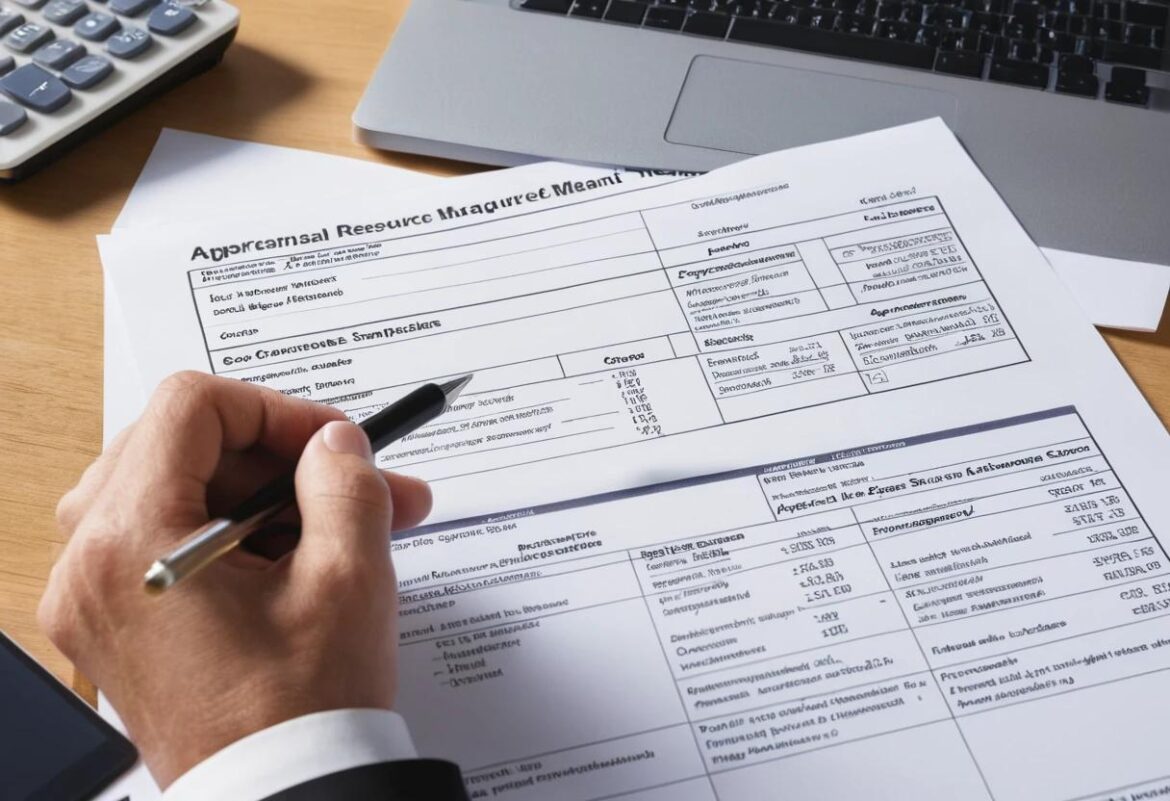Appraisal systems in human resource management are essential tools for evaluating employee performance, fostering growth, and aligning individual efforts with organizational objectives. These systems provide a structured approach to assess achievements, identify areas for improvement, and recognize contributions. By implementing effective appraisal systems, HR professionals can enhance employee engagement, productivity, and overall workplace satisfaction. In this article, we’ll explore the importance and best practices of appraisal systems in HRM.
What Are Appraisal Systems in HRM?
Appraisal systems in human resource management are formal frameworks designed to evaluate employee performance, skills, and contributions to an organization. These systems involve periodic assessments conducted through methods such as performance reviews, goal tracking, and feedback discussions.
The primary purpose of appraisal systems is to provide employees with constructive feedback, align their efforts with organizational goals, and identify opportunities for growth and development. Additionally, these systems support decision-making in promotions, rewards, and training, making them a critical component of effective HRM.
The Importance of Appraisal Systems in HRM
The Importance of Appraisal Systems in Human Resource Management
- Enhances Employee Performance
Regular appraisals provide employees with feedback on their strengths and areas for improvement, fostering continuous growth and productivity. - Aligns Goals with Organizational Objectives
Appraisal systems ensure that individual and team efforts are aligned with broader organizational goals, driving overall success. - Identifies Training Needs
Evaluations help HR identify skill gaps and design targeted training programs to address employee development needs. - Supports Decision-Making
Appraisal systems provide data for key HR decisions, including promotions, salary adjustments, and workforce planning. - Boosts Employee Motivation
Recognizing achievements through appraisals reinforces positive behavior and motivates employees to perform at their best. - Improves Communication
Appraisals facilitate open dialogue between employees and managers, building trust and enhancing workplace relationships. - Promotes Accountability
Clear performance expectations and regular evaluations encourage employees to take ownership of their responsibilities. - Enhances Retention
Employees who feel valued and supported through constructive feedback are more likely to stay committed to the organization. - Drives Organizational Growth
By optimizing individual performance, appraisal systems contribute to achieving strategic goals and improving overall efficiency.
Effective appraisal systems in human resource management are integral to fostering a high-performing, engaged, and satisfied workforce.

Key Components of an Effective Appraisal System
Key Components of an Effective Appraisal System in Human Resource Management
- Clear Objectives
Define the purpose of the appraisal system, whether it’s performance evaluation, career development, or goal alignment. - Standardized Criteria
Establish consistent evaluation criteria that are relevant to the job roles and aligned with organizational goals. - Regular Feedback
Incorporate ongoing feedback alongside formal appraisals to ensure continuous improvement and engagement. - Employee Involvement
Engage employees in the appraisal process by encouraging self-assessments and discussions about their performance and aspirations. - Goal Alignment
Link individual and team goals with broader organizational objectives to create a unified focus on success. - Diverse Evaluation Methods
Use a combination of methods, such as 360-degree feedback, manager assessments, and peer reviews, for a comprehensive evaluation. - Training for Managers
Provide training to managers on conducting appraisals effectively, ensuring fairness and consistency. - Actionable Insights
Generate clear, actionable outcomes from appraisals, such as identifying training needs or setting future goals. - Confidentiality and Fairness
Ensure that the process is transparent, unbiased, and respects employee confidentiality. - Technology Integration
Utilize performance management software to streamline the appraisal process, track progress, and enhance data accuracy.
By incorporating these components, organizations can develop effective appraisal systems in human resource management that drive performance, engagement, and growth.
Read Also : Comprehensive Guide to Performance Management in Human Resource Management
Types of Appraisal Systems in HRM
Types of Appraisal Systems in Human Resource Management
- 360-Degree Feedback
Collects feedback from multiple sources, including managers, peers, subordinates, and sometimes clients, for a comprehensive performance evaluation. - Management by Objectives (MBO)
Focuses on evaluating employees based on the achievement of specific, measurable goals that align with organizational objectives. - Behaviorally Anchored Rating Scales (BARS)
Uses defined behavioral examples to rate employees, ensuring clarity and consistency in evaluating performance. - Self-Appraisal
Encourages employees to assess their own performance, fostering self-awareness and accountability. - Peer Appraisal
Relies on input from colleagues who work closely with the employee, offering insights into teamwork and collaboration. - Graphic Rating Scale
Uses a simple rating scale to evaluate specific traits or behaviors, such as reliability, teamwork, or punctuality. - Critical Incident Method
Documents specific instances of an employee’s effective or ineffective behavior over time to inform the appraisal. - Ranking Method
Ranks employees in order of performance, from highest to lowest, to compare contributions within a team or organization. - Checklist Method
Evaluates employees based on a checklist of desired qualities, behaviors, or accomplishments. - Assessment Centers
Involves simulations, role-playing, and other exercises to assess skills, leadership potential, and problem-solving abilities.
Each type of appraisal system in human resource management serves unique purposes and can be selected based on organizational needs and employee roles.
Read Also : Comprehensive Guide to Improvement Plans in Human Resource Management

Challenges in Implementing Appraisal Systems
Challenges in Implementing Appraisal Systems in Human Resource Management
- Bias in Evaluation
Personal biases, such as favoritism or stereotyping, can lead to unfair assessments and dissatisfaction among employees. - Inconsistent Standards
Lack of standardized criteria across departments or teams can result in inconsistent and subjective appraisals. - Resistance from Employees
Employees may perceive appraisals as overly critical or stressful, leading to resistance or disengagement. - Lack of Manager Training
Managers may lack the necessary skills to conduct appraisals effectively, resulting in unclear feedback and missed opportunities for improvement. - Poor Communication
Insufficient communication about the purpose, process, or outcomes of appraisals can create misunderstandings and mistrust. - Time-Intensive Process
Conducting thorough appraisals can be time-consuming, particularly in large organizations with limited resources. - Limited Follow-Up
Failure to act on appraisal outcomes, such as providing training or addressing concerns, undermines the system’s effectiveness. - Overemphasis on Negative Feedback
Focusing primarily on weaknesses rather than strengths can demotivate employees and hinder development. - Lack of Employee Involvement
Excluding employees from the process can reduce engagement and prevent valuable self-assessments. - Inadequate Technology Support
Outdated or inefficient tools can make managing and tracking appraisals cumbersome and prone to errors.
Overcoming these challenges is crucial for implementing effective appraisal systems in human resource management that promote fairness, engagement, and development.
Read Also : Comprehensive Guide to Goal Setting in Human Resource Management
Best Practices for Effective Appraisal Systems
Best Practices for Effective Appraisal Systems in Human Resource Management
- Set Clear Objectives
Define the purpose of the appraisal system, whether it’s performance evaluation, goal alignment, or identifying training needs, to guide the process effectively. - Develop Standardized Criteria
Establish consistent and objective evaluation metrics tailored to specific roles and aligned with organizational goals. - Incorporate Ongoing Feedback
Supplement formal appraisals with regular check-ins and feedback sessions to ensure continuous improvement and communication. - Provide Manager Training
Equip managers with the skills to conduct appraisals fairly, deliver constructive feedback, and foster productive discussions. - Use Multiple Evaluation Methods
Combine self-assessments, peer reviews, and supervisor evaluations for a comprehensive view of employee performance. - Encourage Employee Participation
Involve employees in the process by encouraging self-assessments and setting mutually agreed-upon goals. - Focus on Development
Emphasize personal and professional growth by identifying areas for improvement and creating actionable development plans. - Leverage Technology
Utilize performance management software to streamline the appraisal process, track progress, and ensure accuracy. - Recognize Achievements
Highlight strengths and accomplishments during appraisals to motivate employees and reinforce positive behaviors. - Ensure Confidentiality and Transparency
Maintain the confidentiality of appraisal discussions while ensuring the process is transparent and perceived as fair. - Act on Appraisal Outcomes
Use insights from appraisals to make informed decisions about promotions, training, or changes in responsibilities. - Review and Update Regularly
Continuously evaluate the appraisal system to ensure it remains relevant and effective as organizational needs evolve.
Implementing these best practices ensures that appraisal systems in human resource management drive performance, engagement, and organizational success.
Read Also : Complete Guide: Training and Development Courses for HR
The Role of HR in Managing Appraisal Systems
The Role of HR in Managing Appraisal Systems in Human Resource Management
- Designing the System
HR develops and structures the appraisal system, ensuring it aligns with organizational objectives and employee roles. - Establishing Evaluation Criteria
HR creates clear, standardized metrics for performance assessment to ensure consistency and fairness across departments. - Providing Manager Training
HR trains managers to conduct appraisals effectively, focusing on delivering constructive feedback and fostering employee development. - Facilitating Employee Participation
HR encourages employees to engage in the process through self-assessments and open discussions about their performance and goals. - Monitoring and Tracking Performance
HR oversees the tracking of employee performance data to provide accurate and actionable insights during appraisals. - Ensuring Compliance
HR ensures the appraisal process adheres to legal and organizational policies, promoting fairness and equity. - Leveraging Technology
HR implements performance management software to streamline appraisals, improve accuracy, and save time. - Providing Support and Resources
HR offers resources such as training programs or development plans to address gaps identified during appraisals. - Acting on Outcomes
HR uses appraisal results to inform decisions about promotions, salary adjustments, and workforce planning. - Reviewing and Improving the System
HR regularly evaluates the appraisal system, incorporating feedback to refine its effectiveness and relevance.
By managing these responsibilities, HR ensures that appraisal systems in human resource management foster employee growth, engagement, and alignment with organizational goals.
Read Also : Guide to Finance for HR Professionals Course

Why HR Professionals Need Training in Appraisal Systems
- Designing Effective Systems
Training equips HR professionals with the skills to create appraisal systems that are fair, consistent, and aligned with organizational goals. - Establishing Clear Criteria
HR learns to develop objective evaluation metrics tailored to specific roles and responsibilities. - Enhancing Feedback Skills
Training helps HR professionals deliver constructive feedback that motivates employees and fosters development. - Addressing Bias
HR professionals gain strategies to recognize and mitigate biases in appraisals, ensuring fairness and equity. - Leveraging Technology
Training provides insights into using performance management tools to streamline the appraisal process and track progress effectively. - Promoting Employee Engagement
HR professionals learn to involve employees in the appraisal process, encouraging participation and ownership of outcomes. - Improving Manager Training
Training enables HR to coach managers on conducting appraisals professionally and effectively. - Aligning with Legal Standards
HR professionals learn to ensure appraisal systems comply with labor laws and organizational policies. - Utilizing Appraisal Data
Training helps HR analyze appraisal outcomes to inform decisions on promotions, training, and workforce planning. - Fostering Continuous Improvement
HR professionals are trained to review and refine appraisal systems regularly, ensuring their relevance and effectiveness.
Investing in training for appraisal systems in human resource management empowers HR professionals to drive employee performance, engagement, and organizational success.
Read Also : A Comprehensive Guide to HR Responsibilities: Key Functions and Strategic Importance
Features of Our Course on Appraisal Systems
At BMC Training, our specialized course on Appraisal Systems in Human Resource Management is designed to help HR professionals implement and manage effective performance evaluation processes. Key features of the course include:
- Expert-Led Instruction
Learn from experienced HR practitioners and industry experts who provide actionable insights into managing appraisal systems. - Comprehensive Curriculum
The course covers essential topics such as creating appraisal frameworks, setting evaluation criteria, and linking performance to organizational goals. - Interactive Learning Modules
Engage in practical exercises, case studies, and role-playing scenarios to develop hands-on expertise in appraisal systems. - Bias Mitigation Techniques
Discover strategies to recognize and reduce biases in appraisals, ensuring fairness and equity. - Feedback and Communication Skills
Learn to deliver constructive feedback effectively and foster productive conversations during performance reviews. - Technology Integration
Understand how to use performance management software to streamline appraisals, track progress, and enhance data accuracy. - Employee Engagement Strategies
Explore methods to involve employees in the appraisal process, promoting participation and ownership of outcomes. - Training Managers for Appraisals
Gain tools to coach managers on conducting fair, consistent, and meaningful performance evaluations. - Legal and Policy Alignment
Learn to ensure appraisal systems comply with labor laws and align with organizational policies and ethics. - Actionable Outcomes
Develop skills to translate appraisal results into actionable plans for training, promotions, and workforce development. - Flexible Learning Options
Choose from in-person workshops, virtual sessions, or blended formats to suit your schedule and preferences.
By enrolling in the Appraisal Systems Course at BMC Training, you’ll gain the expertise to manage performance evaluations that drive employee growth and organizational success. Join us today to advance your HR capabilities!
Read Also : The Most Important Skills for HR Professionals: A Comprehensive Guide
Enhance Performance Appraisals with BMC Training – Enroll Now!
Take your HR skills to the next level with BMC Training’s specialized course on Appraisal Systems in Human Resource Management. This comprehensive program equips HR professionals with the tools to design, implement, and manage effective performance evaluation systems that drive employee growth and organizational success.
Learn from industry experts, engage in practical exercises, and master techniques like unbiased evaluations, constructive feedback, and technology integration. Empower your workforce by aligning individual performance with organizational objectives through impactful appraisals.
Don’t miss the opportunity to make a difference. Enroll today with BMC Training and transform your appraisal systems into a catalyst for success!
Read Also : Top Courses for HR Professionals: Elevate Your Career with BMC Training
FAQs
What are appraisal systems in Human Resource Management, and why are they important?
Appraisal systems in HRM are frameworks for evaluating employee performance and contributions. They are important for providing feedback, identifying development needs, motivating employees, and aligning performance with organizational goals.
What are the key components of an effective appraisal system in HRM?
Key components include clear objectives, standardized criteria, regular feedback, employee involvement, diverse evaluation methods, actionable insights, and alignment with organizational goals.
What are the different types of appraisal systems, and how do they work?
Types include:
- 360-Degree Feedback: Collects feedback from peers, managers, and subordinates.
- Management by Objectives (MBO): Evaluates based on goal achievement.
- Behaviorally Anchored Rating Scales (BARS): Uses specific behavioral examples for ratings.
- Self-Appraisals: Employees assess their own performance.
What challenges do organizations face when implementing appraisal systems, and how can they overcome them?
Challenges include bias, inconsistent criteria, resistance, lack of manager training, and poor communication. These can be overcome by using standardized criteria, training managers, fostering transparency, and leveraging technology for accuracy.
How can HR professionals ensure fairness and transparency in the appraisal process?
HR can ensure fairness by using objective evaluation criteria, training managers to avoid bias, involving employees in the process, and clearly communicating expectations and outcomes.
Read Also : Comprehensive Guide to Feedback Mechanisms in Human Resource Management


